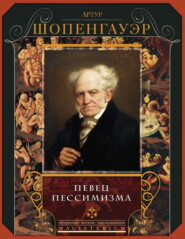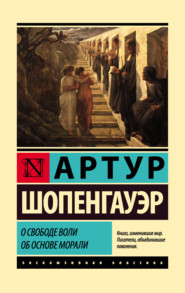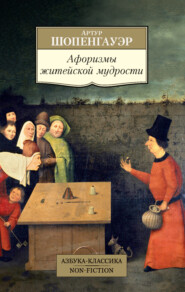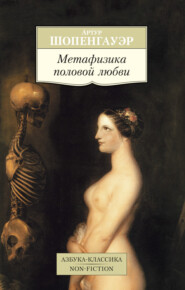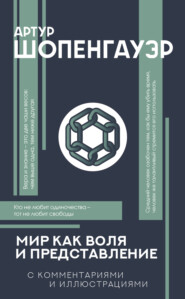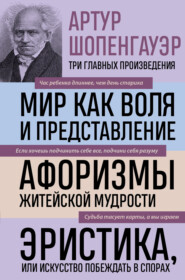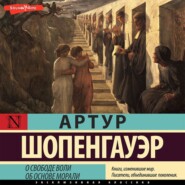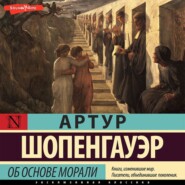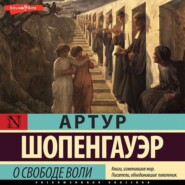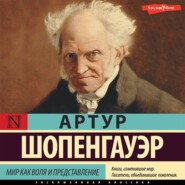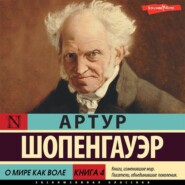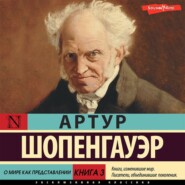По всем вопросам обращайтесь на: info@litportal.ru
(©) 2003-2024.
✖
Essays of Schopenhauer
Настройки чтения
Размер шрифта
Высота строк
Поля
Previously, there had been an obscure point in his knowledge of the world which had arisen through his omitting something in his early education, whether he had been either artificially educated by men or just naturally by his own experience. Therefore one should try to find out the strictly natural course of knowledge, so that by keeping methodically to it children may become acquainted with the affairs of the world, without getting false ideas into their heads, which frequently cannot be driven out again. In carrying this out, one must next take care that children do not use words with which they connect no clear meaning. Even children have, as a rule, that unhappy tendency of being satisfied with words instead of wishing to understand things, and of learning words by heart, so that they may make use of them when they are in a difficulty. This tendency clings to them afterwards, so that the knowledge of many learned men becomes mere verbosity.
However, the principal thing must always be to let one's observations precede one's ideas, and not the reverse as is usually and unfortunately the case; which may be likened to a child coming into the world with its feet foremost, or a rhyme begun before thinking of its reason. While the child's mind has made a very few observations one inculcates it with ideas and opinions, which are, strictly speaking, prejudices. His observations and experience are developed through this ready-made apparatus instead of his ideas being developed out of his own observations. In viewing the world one sees many things from many sides, consequently this is not such a short or quick way of learning as that which makes use of abstract ideas, and quickly comes to a decision about everything; therefore preconceived ideas will not be rectified until late, or it may be they are never rectified. For, when a man's view contradicts his ideas, he will reject at the outset what it renders evident as one-sided, nay, he will deny it and shut his eyes to it, so that his preconceived ideas may remain unaffected. And so it happens that many men go through life full of oddities, caprices, fancies, and prejudices, until they finally become fixed ideas. He has never attempted to abstract fundamental ideas from his own observations and experience, because he has got everything ready-made from other people; and it is for this very reason that he and countless others are so insipid and shallow. Instead of such a system, the natural system of education should be employed in educating children. No idea should be impregnated but what has come through the medium of observations, or at any rate been verified by them. A child would have fewer ideas, but they would be well-grounded and correct. It would learn to measure things according to its own standard and not according to another's. It would then never acquire a thousand whims and prejudices which must be eradicated by the greater part of subsequent experience and education. Its mind would henceforth be accustomed to thoroughness and clearness; the child would rely on its own judgment, and be free from prejudices. And, in general, children should not get to know life, in any aspect whatever, from the copy before they have learnt it from the original. Instead, therefore, of hastening to place mere books in their hands, one should make them gradually acquainted with things and the circumstances of human life, and above everything one should take care to guide them to a clear grasp of reality, and to teach them to obtain their ideas directly from the real world, and to form them in keeping with it – but not to get them from elsewhere, as from books, fables, or what others have said – and then later to make use of such ready-made ideas in real life. The result will be that their heads are full of chimeras and that some will have a wrong comprehension of things, and others will fruitlessly endeavour to remodel the world according to those chimeras, and so get on to wrong paths both in theory and practice. For it is incredible how much harm is done by false notions which have been implanted early in life, only to develop later on into prejudices; the later education which we get from the world and real life must be employed in eradicating these early ideas. And this is why, as is related by Diogenes Laertius, Antisthenes gave the following answer: έρωτηθεις τι των μαθηματων ἀναγκαιοτατον, έφη, "το κακα ἀπομαθειν." (Interrogatus quaenam esset disciplina maxime necessaria, Mala, inquit, dediscere.)
* * * * *
Children should be kept from all kinds of instruction that may make errors possible until their sixteenth year, that is to say, from philosophy, religion, and general views of every description; because it is the errors that are acquired in early days that remain, as a rule, ineradicable, and because the faculty of judgment is the last to arrive at maturity. They should only be interested in such things that make errors impossible, such as mathematics, in things which are not very dangerous, such as languages, natural science, history, and so forth; in general, the branches of knowledge which are to be taken up at any age must be within reach of the intellect at that age and perfectly comprehensible to it. Childhood and youth are the time for collecting data and getting to know specially and thoroughly individual and particular things. On the other hand, all judgment of a general nature must at that time be suspended, and final explanations left alone. One should leave the faculty of judgment alone, as it only comes with maturity and experience, and also take care that one does not anticipate it by inculcating prejudice, when it will be crippled for ever.
On the contrary, the memory is to be specially exercised, as it has its greatest strength and tenacity in youth; however, what has to be retained must be chosen with the most careful and scrupulous consideration. For as it is what we have learnt well in our youth that lasts, we should take the greatest possible advantage of this precious gift. If we picture to ourselves how deeply engraven on our memory the people are whom we knew during the first twelve years of our life, and how indelibly imprinted are also the events of that time, and most of the things that we then experienced, heard, or learnt, the idea of basing education on this susceptibility and tenacity of the youthful mind will seem natural; in that the mind receives its impressions according to a strict method and a regular system. But because the years of youth that are assigned to man are only few, and the capacity for remembering, in general, is always limited (and still more so the capacity for remembering of the individual), everything depends on the memory being filled with what is most essential and important in any department of knowledge, to the exclusion of everything else. This selection should be made by the most capable minds and masters in every branch of knowledge after the most mature consideration, and the result of it established. Such a selection must be based on a sifting of matters which are necessary and important for a man to know in general, and also for him to know in a particular profession or calling. Knowledge of the first kind would have to be divided into graduated courses, like an encyclopædia, corresponding to the degree of general culture which each man has attained in his external circumstances; from a course restricted to what is necessary for primary instruction up to the matter contained in every branch of the philosophical faculty. Knowledge of the second kind would, however, be reserved for him who had really mastered the selection in all its branches. The whole would give a canon specially devised for intellectual education, which naturally would require revision every ten years. By such an arrangement the youthful power of the memory would be put to the best advantage, and it would furnish the faculty of judgment with excellent material when it appeared later on.
* * * * *
What is meant by maturity of knowledge is that state of perfection to which any one individual is able to bring it, when an exact correspondence has been effected between the whole of his abstract ideas and his own personal observations: whereby each of his ideas rests directly or indirectly on a basis of observation, which alone gives it any real value; and likewise he is able to place every observation that he makes under the right idea corresponding to it.
Maturity of knowledge is the work of experience alone, and consequently of time. For the knowledge we acquire from our own observation is, as a rule, distinct from that we get through abstract ideas; the former is acquired in the natural way, while the latter comes through good and bad instruction and what other people have told to us. Consequently, in youth there is generally little harmony and connection between our ideas, which mere expressions have fixed, and our real knowledge, which has been acquired by observation. Later they both gradually approach and correct each other; but maturity of knowledge does not exist until they have become quite incorporated. This maturity is quite independent of that other kind of perfection, the standard of which may be high or low, I mean the perfection to which the capacities of an individual may be brought; it is not based on a correspondence between the abstract and intuitive knowledge, but on the degree of intensity of each.
The most necessary thing for the practical man is the attainment of an exact and thorough knowledge of what is really going on in the world; but it is also the most irksome, for a man may continue studying until old age without having learnt all that is to be learnt; while one can master the most important things in the sciences in one's youth. In getting such a knowledge of the world, it is as a novice that the boy and youth have the first and most difficult lessons to learn; but frequently even the matured man has still much to learn. The study is of considerable difficulty in itself, but it is made doubly difficult by novels, which depict the ways of the world and of men who do not exist in real life. But these are accepted with the credulity of youth, and become incorporated with the mind; so that now, in the place of purely negative ignorance, a whole framework of wrong ideas, which are positively wrong, crops up, subsequently confusing the schooling of experience and representing the lesson it teaches in a false light. If the youth was previously in the dark, he will now be led astray by a will-o'-the-wisp: and with a girl this is still more frequently the case. They have been deluded into an absolutely false view of life by reading novels, and expectations have been raised that can never be fulfilled. This generally has the most harmful effect on their whole lives. Those men who had neither time nor opportunity to read novels in their youth, such as those who work with their hands, have decided advantage over them. Few of these novels are exempt from reproach – nay, whose effect is contrary to bad. Before all others, for instance, Gil Blas and the other works of Le Sage (or rather their Spanish originals); further, The Vicar of Wakefield, and to some extent the novels of Walter Scott. Don Quixote may be regarded as a satirical presentation of the error in question.
ON READING AND BOOKS
Ignorance is degrading only when it is found in company with riches. Want and penury restrain the poor man; his employment takes the place of knowledge and occupies his thoughts: while rich men who are ignorant live for their pleasure only, and resemble a beast; as may be seen daily. They are to be reproached also for not having used wealth and leisure for that which lends them their greatest value.
When we read, another person thinks for us: we merely repeat his mental process. It is the same as the pupil, in learning to write, following with his pen the lines that have been pencilled by the teacher. Accordingly, in reading, the work of thinking is, for the greater part, done for us. This is why we are consciously relieved when we turn to reading after being occupied with our own thoughts. But, in reading, our head is, however, really only the arena of some one else's thoughts. And so it happens that the person who reads a great deal – that is to say, almost the whole day, and recreates himself by spending the intervals in thoughtless diversion, gradually loses the ability to think for himself; just as a man who is always riding at last forgets how to walk. Such, however, is the case with many men of learning: they have read themselves stupid. For to read in every spare moment, and to read constantly, is more paralysing to the mind than constant manual work, which, at any rate, allows one to follow one's own thoughts. Just as a spring, through the continual pressure of a foreign body, at last loses its elasticity, so does the mind if it has another person's thoughts continually forced upon it. And just as one spoils the stomach by overfeeding and thereby impairs the whole body, so can one overload and choke the mind by giving it too much nourishment. For the more one reads the fewer are the traces left of what one has read; the mind is like a tablet that has been written over and over. Hence it is impossible to reflect; and it is only by reflection that one can assimilate what one has read if one reads straight ahead without pondering over it later, what has been read does not take root, but is for the most part lost. Indeed, it is the same with mental as with bodily food: scarcely the fifth part of what a man takes is assimilated; the remainder passes off in evaporation, respiration, and the like.
From all this it may be concluded that thoughts put down on paper are nothing more than footprints in the sand: one sees the road the man has taken, but in order to know what he saw on the way, one requires his eyes.
* * * * *
No literary quality can be attained by reading writers who possess it: be it, for example, persuasiveness, imagination, the gift of drawing comparisons, boldness or bitterness, brevity or grace, facility of expression or wit, unexpected contrasts, a laconic manner, naïveté, and the like. But if we are already gifted with these qualities – that is to say, if we possess them potentia– we can call them forth and bring them to consciousness; we can discern to what uses they are to be put; we can be strengthened in our inclination, nay, may have courage, to use them; we can judge by examples the effect of their application and so learn the correct use of them; and it is only after we have accomplished all this that we actu possess these qualities. This is the only way in which reading can form writing, since it teaches us the use to which we can put our own natural gifts; and in order to do this it must be taken for granted that these qualities are in us. Without them we learn nothing from reading but cold, dead mannerisms, and we become mere imitators.
* * * * *
The health officer should, in the interest of one's eyes, see that the smallness of print has a fixed minimum, which must not be exceeded. When I was in Venice in 1818, at which time the genuine Venetian chain was still being made, a goldsmith told me that those who made the catena fina turned blind at thirty.
* * * * *
As the strata of the earth preserve in rows the beings which lived in former times, so do the shelves of a library preserve in a like manner the errors of the past and expositions concerning them. Like those creatures, they too were full of life in their time and made a great deal of noise; but now they are stiff and fossilised, and only of interest to the literary palaeontologist.
* * * * *
According to Herodotus, Xerxes wept at the sight of his army, which was too extensive for him to scan, at the thought that a hundred years hence not one of all these would be alive. Who would not weep at the thought in looking over a big catalogue that of all these books not one will be in existence in ten years' time?
It is the same in literature as in life. Wherever one goes one immediately comes upon the incorrigible mob of humanity. It exists everywhere in legions; crowding, soiling everything, like flies in summer. Hence the numberless bad books, those rank weeds of literature which extract nourishment from the corn and choke it.
They monopolise the time, money, and attention which really belong to good books and their noble aims; they are written merely with a view to making money or procuring places. They are not only useless, but they do positive harm. Nine-tenths of the whole of our present literature aims solely at taking a few shillings out of the public's pocket, and to accomplish this, author, publisher, and reviewer have joined forces.
There is a more cunning and worse trick, albeit a profitable one. Littérateurs, hack-writers, and productive authors have succeeded, contrary to good taste and the true culture of the age, in bringing the world elegante into leading-strings, so that they have been taught to read a tempo and all the same thing – namely, the newest books order that they may have material for conversation in their social circles. Bad novels and similar productions from the pen of writers who were once famous, such as Spindler, Bulwer, Eugène Sue, and so on, serve this purpose. But what can be more miserable than the fate of a reading public of this kind, that feels always impelled to read the latest writings of extremely commonplace authors who write for money only, and therefore exist in numbers? And for the sake of this they merely know by name the works of the rare and superior writers, of all ages and countries.
Literary newspapers, since they print the daily smatterings of commonplace people, are especially a cunning means for robbing from the aesthetic public the time which should be devoted to the genuine productions of art for the furtherance of culture.
Hence, in regard to our subject, the art of not reading is highly important. This consists in not taking a book into one's hand merely because it is interesting the great public at the time – such as political or religious pamphlets, novels, poetry, and the like, which make a noise and reach perhaps several editions in their first and last years of existence. Remember rather that the man who writes for fools always finds a large public: and only read for a limited and definite time exclusively the works of great minds, those who surpass other men of all times and countries, and whom the voice of fame points to as such. These alone really educate and instruct.
One can never read too little of bad, or too much of good books: bad books are intellectual poison; they destroy the mind.
In order to read what is good one must make it a condition never to read what is bad; for life is short, and both time and strength limited.
* * * * *
Books are written sometimes about this, sometimes about that great thinker of former times, and the public reads these books, but not the works of the man himself. This is because it wants to read only what has just been printed, and because similis simili gaudet, and it finds the shallow, insipid gossip of some stupid head of to-day more homogeneous and agreeable than the thoughts of great minds. I have to thank fate, however, that a fine epigram of A.B. Schlegel, which has since been my guiding star, came before my notice as a youth:
"Leset fleizig die Alten, die wahren eigentlich Alten
Was die Neuen davon sagen bedeutet nicht viel."
Oh, how like one commonplace mind is to another! How they are all fashioned in one form! How they all think alike under similar circumstances, and never differ! This is why their views are so personal and petty. And a stupid public reads the worthless trash written by these fellows for no other reason than that it has been printed to-day, while it leaves the works of great thinkers undisturbed on the bookshelves.
Incredible are the folly and perversity of a public that will leave unread writings of the noblest and rarest of minds, of all times and all countries, for the sake of reading the writings of commonplace persons which appear daily, and breed every year in countless numbers like flies; merely because these writings have been printed to-day and are still wet from the press. It would be better if they were thrown on one side and rejected the day they appeared, as they must be after the lapse of a few years. They will then afford material for laughter as illustrating the follies of a former time.
It is because people will only read what is the newest instead of what is the best of all ages, that writers remain in the narrow circle of prevailing ideas, and that the age sinks deeper and deeper in its own mire.
* * * * *
There are at all times two literatures which, although scarcely known to each other, progress side by side – the one real, the other merely apparent. The former grows into literature that lasts. Pursued by people who live for science or poetry, it goes its way earnestly and quietly, but extremely slowly; and it produces in Europe scarcely a dozen works in a century, which, however, are permanent. The other literature is pursued by people who live on science or poetry; it goes at a gallop amid a great noise and shouting of those taking part, and brings yearly many thousand works into the market. But after a few years one asks, Where are they? where is their fame, which was so great formerly? This class of literature may be distinguished as fleeting, the other as permanent.
* * * * *
It would be a good thing to buy books if one could also buy the time to read them; but one usually confuses the purchase of books with the acquisition of their contents. To desire that a man should retain everything he has ever read, is the same as wishing him to retain in his stomach all that he has ever eaten. He has been bodily nourished on what he has eaten, and mentally on what he has read, and through them become what he is. As the body assimilates what is homogeneous to it, so will a man retain what interests him; in other words, what coincides with his system of thought or suits his ends. Every one has aims, but very few have anything approaching a system of thought. This is why such people do not take an objective interest in anything, and why they learn nothing from what they read: they remember nothing about it.
Repetitio est mater studiorum. Any kind of important book should immediately be read twice, partly because one grasps the matter in its entirety the second time, and only really understands the beginning when the end is known; and partly because in reading it the second time one's temper and mood are different, so that one gets another impression; it may be that one sees the matter in another light.
Works are the quintessence of a mind, and are therefore always of by far greater value than conversation, even if it be the conversation of the greatest mind. In every essential a man's works surpass his conversation and leave it far behind. Even the writings of an ordinary man may be instructive, worth reading, and entertaining, for the simple reason that they are the quintessence of that man's mind – that is to say, the writings are the result and fruit of his whole thought and study; while we should be dissatisfied with his conversation. Accordingly, it is possible to read books written by people whose conversation would give us no satisfaction; so that the mind will only by degrees attain high culture by finding entertainment almost entirely in books, and not in men.
There is nothing that so greatly recreates the mind as the works of the old classic writers. Directly one has been taken up, even if it is only for half-an-hour, one feels as quickly refreshed, relieved, purified, elevated, and strengthened as if one had refreshed oneself at a mountain stream. Is this due to the perfections of the old languages, or to the greatness of the minds whose works have remained unharmed and untouched for centuries? Perhaps to both combined. This I know, directly we stop learning the old languages (as is at present threatening) a new class of literature will spring up, consisting of writing that is more barbaric, stupid, and worthless than has ever yet existed; that, in particular, the German language, which possesses some of the beauties of the old languages, will be systematically spoilt and stripped by these worthless contemporary scribblers, until, little by little, it becomes impoverished, crippled, and reduced to a miserable jargon.
Half a century is always a considerable time in the history of the universe, for the matter which forms it is always shifting; something is always taking place. But the same length of time in literature often goes for nothing, because nothing has happened; unskilful attempts don't count; so that we are exactly where we were fifty years previously.
To illustrate this: imagine the progress of knowledge among mankind in the form of a planet's course. The false paths the human race soon follows after any important progress has been made represent the epicycles in the Ptolemaic system; after passing through any one of them the planet is just where it was before it entered it. The great minds, however, which really bring the race further on its course, do not accompany it on the epicycles which it makes every time. This explains why posthumous fame is got at the expense of contemporary fame, and vice versâ. We have an instance of such an epicycle in the philosophy of Fichte and Schelling, crowned by Hegel's caricature of it. This epicycle issued from the limit to which philosophy had been finally brought by Kant, where I myself took it up again later to carry it further. In the interim the false philosophers I have mentioned, and some others, passed through their epicycle, which has just been terminated; hence the people who accompanied them are conscious of being exactly at the point from which they started.
This condition of things shows why the scientific, literary, and artistic spirit of the age is declared bankrupt about every thirty years. During that period the errors have increased to such an extent that they fall under the weight of their absurdity; while at the same time the opposition to them has become stronger. At this point there is a crash, which is followed by an error in the opposite direction. To show the course that is taken in its periodical return would be the true practical subject of the history of literature; little notice is taken of it, however. Moreover, through the comparative shortness of such periods, the data of remote times are with difficulty collected; hence the matter can be most conveniently observed in one's own age. An example of this taken from physical science is found in Werter's Neptunian geology. But let me keep to the example already quoted above, for it is nearest to us. In German philosophy Kant's brilliant period was immediately followed by another period, which aimed at being imposing rather than convincing. Instead of being solid and clear, it aimed at being brilliant and hyperbolical, and, in particular, unintelligible; instead of seeking truth, it intrigued. Under these circumstances philosophy could make no progress. Ultimately the whole school and its method became bankrupt. For the audacious, sophisticated nonsense on the one hand, and the unconscionable praise on the other of Hegel and his fellows, as well as the apparent object of the whole affair, rose to such a pitch that in the end the charlatanry of the thing was obvious to everybody; and when, in consequence of certain revelations, the protection that had been given it by the upper classes was withdrawn, it was talked about by everybody. This most miserable of all the philosophies that have ever existed dragged down with it into the abyss of discredit the systems of Fichte and Schelling, which had preceded it. So that the absolute philosophical futility of the first half of the century following upon Kant in Germany is obvious; and yet the Germans boast of their gift for philosophy compared with foreigners, especially since an English writer, with malicious irony, called them a nation of thinkers.
Those who want an example of the general scheme of epicycles taken from the history of art need only look at the School of Sculpture which flourished in the last century under Bernini, and especially at its further cultivation in France. This school represented commonplace nature instead of antique beauty, and the manners of a French minuet instead of antique simplicity and grace. It became bankrupt when, under Winckelmann's direction, a return was made to the antique school. Another example is supplied in the painting belonging to the first quarter of this century. Art was regarded merely as a means and instrument of mediaeval religious feeling, and consequently ecclesiastical subjects alone were chosen for its themes. These, however, were treated by painters who were wanting in earnestness of faith, and in their delusion they took for examples Francesco Francia, Pietro Perugino, Angelico da Fiesole, and others like them, even holding them in greater esteem than the truly great masters who followed. In view of this error, and because in poetry an analogous effort had at the same time met with favour, Goethe wrote his parable Pfaffenspiel. This school, reputedly capricious, became bankrupt, and was followed by a return to nature, which made itself known in genre pictures and scenes of life of every description, even though it strayed sometimes into vulgarity.
It is the same with the progress of the human mind in the history of literature, which is for the most part like the catalogue of a cabinet of deformities; the spirit in which they keep the longest is pigskin. We do not need to look there for the few who have been born shapely; they are still alive, and we come across them in every part of the world, like immortals whose youth is ever fresh. They alone form what I have distinguished as real literature, the history of which, although poor in persons, we learn from our youth up out of the mouths of educated people, and not first of all from compilations. As a specific against the present prevailing monomania for reading literary histories, so that one may be able to chatter about everything without really knowing anything, let me refer you to a passage from Lichtenberg which is well worth reading (vol. ii. p. 302 of the old edition).
But I wish some one would attempt a tragical history of literature, showing how the greatest writers and artists have been treated during their lives by the various nations which have produced them and whose proudest possessions they are. It would show us the endless fight which the good and genuine works of all periods and countries have had to carry on against the perverse and bad. It would depict the martyrdom of almost all those who truly enlightened humanity, of almost all the great masters in every kind of art; it would show us how they, with few exceptions, were tormented without recognition, without any to share their misery, without followers; how they existed in poverty and misery whilst fame, honour, and riches fell to the lot of the worthless; it would reveal that what happened to them happened to Esau, who, while hunting the deer for his father, was robbed of the blessing by Jacob disguised in his brother's coat; and how through it all the love of their subject kept them up, until at last the trying fight of such a teacher of the human race is ended, the immortal laurel offered to him, and the time come when it can be said of him
"Der schwere Panzer wird zum Flügelkleide
Kurz ist der Schmerz, unendlich ist die Freude."






